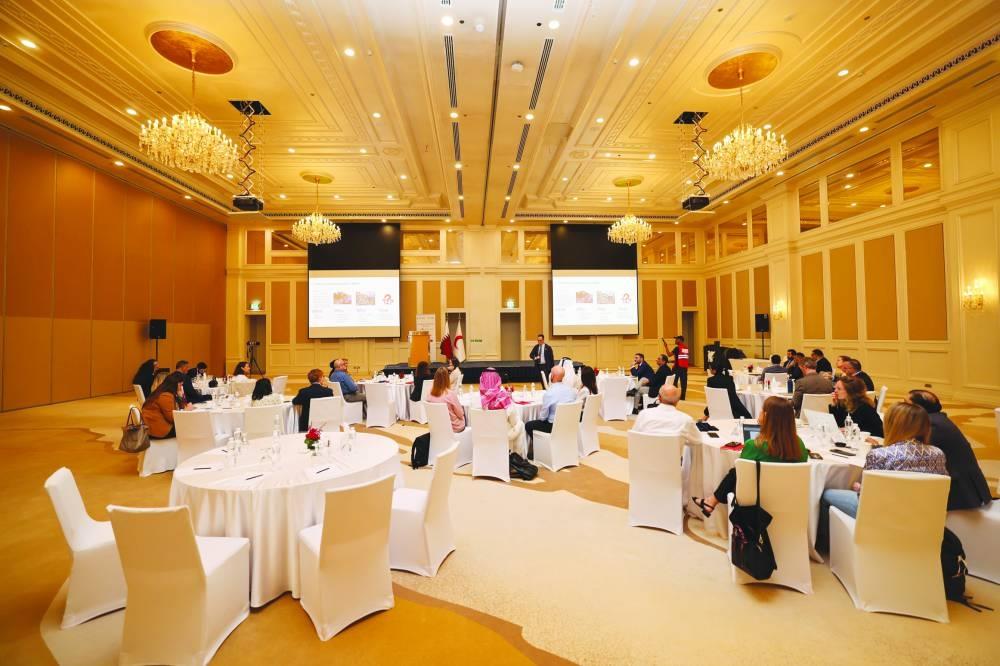
403
Sorry!!
Error! We're sorry, but the page you were looking for doesn't exist.
Qatar Red Crescent Society And IFRC Strengthen Humanitarian Diplomacy Tools To Address Global Challenges
(MENAFN- Gulf Times) Qatar Red Crescent Society (QRCS), in co-operation with the International Federation of Red Cross and Red Crescent Societies (IFRC), organised a workshop and roundtable discussion on humanitarian diplomacy.
The event was attended by representatives from many National Societies, IFRC, the International Committee of the Red Cross (ICRC), ambassadors, and members of the diplomatic missions in Qatar.
Titled“Humanitarian Diplomacy: Sharing Experience and Building Collaborative Action”, a two-day regional workshop was held with the participations of humanitarian diplomacy specialists from Red Cross and Red Crescent National Societies, heads of IFRC delegations in the Middle East and North Africa (Mena) region, representatives of humanitarian partners, and officials from ICRC's regional delegation and representation mission in Qatar.
On day one, the sessions discussed mapping and building knowledge, capacity, and expertise in humanitarian diplomacy. Day two sessions focused on sharing humanitarian diplomacy insights among the components of the International Red Cross and Red Crescent Movement.
QRCS secretary-general Faisal Mohamed al-Emadi said:“Here in Qatar, we deeply believe in dialogue, co-operation, and solidarity. Over the years, Qatar has been a strong advocate for humanitarian diplomacy and for building bridges among nations, institutions, and communities. QRCS works every single day to translate this vision into practice through our relief missions, development programs, and contribution to international humanitarian forums”.
He revealed arrangements in progress with partners to draft a Universal Charter for Humanitarian Diplomacy, an initiative aimed at creating a global framework for effective humanitarian diplomacy, promoting dedicated engagement worldwide, and encouraging respect for human values, towards the ultimate goal of making the world a better and safer place for everyone to live.
“The world needs more humanitarian diplomacy, not as a slogan, but as an everyday practice,” added al-Emadi.“I believe this workshop will help us move from ideas to real impact, and from words to meaningful results for the people we serve”.
QRCS and IFRC co-organised a roundtable discussion on“Humanitarian Diplomacy: Principled Engagement for Long-Term Impact”, with two panel discussions on how principled humanitarian diplomacy, though inherently challenging and politically sensitive, can generate both immediate humanitarian access and durable impacts, as well as reflections about concrete tools, field experience, and the evolving norms that shape this work.
The event saw high-level participation from numerous government, diplomatic, humanitarian, and international organisations.
The attendance from QRCS included Abdullah Hamed al-Mulla, board member; al-Emadi, Mohamed Ahmed al-Beshri, assistant secretary-general for Communication and Resource Development, and Dr Aiham Ismail Al-Sukhni, head of International Relations.
Other participants included a delegation from Qatar's Ministry of Foreign Affairs, headed by HE Sara bint Abdullah al-Saadi, director of the Department of Human Rights, along with ambassadors and members of the foreign diplomatic missions in Qatar, among others.
The event was attended by representatives from many National Societies, IFRC, the International Committee of the Red Cross (ICRC), ambassadors, and members of the diplomatic missions in Qatar.
Titled“Humanitarian Diplomacy: Sharing Experience and Building Collaborative Action”, a two-day regional workshop was held with the participations of humanitarian diplomacy specialists from Red Cross and Red Crescent National Societies, heads of IFRC delegations in the Middle East and North Africa (Mena) region, representatives of humanitarian partners, and officials from ICRC's regional delegation and representation mission in Qatar.
On day one, the sessions discussed mapping and building knowledge, capacity, and expertise in humanitarian diplomacy. Day two sessions focused on sharing humanitarian diplomacy insights among the components of the International Red Cross and Red Crescent Movement.
QRCS secretary-general Faisal Mohamed al-Emadi said:“Here in Qatar, we deeply believe in dialogue, co-operation, and solidarity. Over the years, Qatar has been a strong advocate for humanitarian diplomacy and for building bridges among nations, institutions, and communities. QRCS works every single day to translate this vision into practice through our relief missions, development programs, and contribution to international humanitarian forums”.
He revealed arrangements in progress with partners to draft a Universal Charter for Humanitarian Diplomacy, an initiative aimed at creating a global framework for effective humanitarian diplomacy, promoting dedicated engagement worldwide, and encouraging respect for human values, towards the ultimate goal of making the world a better and safer place for everyone to live.
“The world needs more humanitarian diplomacy, not as a slogan, but as an everyday practice,” added al-Emadi.“I believe this workshop will help us move from ideas to real impact, and from words to meaningful results for the people we serve”.
QRCS and IFRC co-organised a roundtable discussion on“Humanitarian Diplomacy: Principled Engagement for Long-Term Impact”, with two panel discussions on how principled humanitarian diplomacy, though inherently challenging and politically sensitive, can generate both immediate humanitarian access and durable impacts, as well as reflections about concrete tools, field experience, and the evolving norms that shape this work.
The event saw high-level participation from numerous government, diplomatic, humanitarian, and international organisations.
The attendance from QRCS included Abdullah Hamed al-Mulla, board member; al-Emadi, Mohamed Ahmed al-Beshri, assistant secretary-general for Communication and Resource Development, and Dr Aiham Ismail Al-Sukhni, head of International Relations.
Other participants included a delegation from Qatar's Ministry of Foreign Affairs, headed by HE Sara bint Abdullah al-Saadi, director of the Department of Human Rights, along with ambassadors and members of the foreign diplomatic missions in Qatar, among others.

Legal Disclaimer:
MENAFN provides the
information “as is” without warranty of any kind. We do not accept
any responsibility or liability for the accuracy, content, images,
videos, licenses, completeness, legality, or reliability of the information
contained in this article. If you have any complaints or copyright
issues related to this article, kindly contact the provider above.


















Comments
No comment